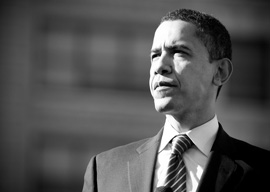
August 29, 2012

President Obama
In my 2008 reader’s guide to Obama’s memoir, America’s Half-Blood Prince, I had offered a more domestic, less ideological interpretation than D’Souza’s subsequent tome. Dreams from My Father’s subtitle, A Story of Race and Inheritance, signifies Obama’s attempt to prove himself Black Enough to succeed with black Chicago voters.
My theory has always been that there’s no mystery about Obama. Just as George W. Bush was (to use college admissions jargon) the Legacy President, Obama is the Affirmative Action President. Both Bush and Obama achieved Presidential Timber status only because of their daddies’ status.
This view has proven universally unpopular.
Interestingly, Maraniss says that Obama’s Dreams vastly exaggerated the role blackness played in Obama’s first quarter of a century. Obama grew up in a Hawaii where mixed-race kids were common and then hung out in Los Angeles and New York with an elite cosmopolitan crowd, largely Pakistani Marxist millionaires. His friends considered him less African American than “multicultural” or “international.” Obama’s wealthy Australian girlfriend Genevieve Cook told Maraniss:
[H]e felt like an imposter. Because he was so white. There was hardly a black bone in his body.
Obama’s Pakistani friend Beenu Mahmood said:
To be honest, he had never had many black friends. Not that he had anything against that, just that he was part of that other set, the international set.
Indeed, Obama reminisced with Maraniss that the “obvious path for me given my background” was “working in the State Department, in the Foreign Service, or working for an international foundation….”
So D’Souza’s theory that Third World anticolonialism is part of Obama’s emotional heritage is less derisible than has been assumed.
On the other hand, has Obama proven to be such an effectual personality that his innermost dreams are likely to come true?
Obama’s assurance that in 2013 he and Putin will finally get down to a high-stakes poker game with our nuclear defenses as the chips is something that alarms me”but not because I fear that Obama will intentionally surrender. Instead, I’m concerned that, one on one, the formidable Putin would drink our president’s milk shake. Recall that after an ailing, drugged-up Kennedy met with an unimpressed Khrushchev in 1961, the Cuban Missile Crisis followed a year later.
The good news is that Obama is reasonably well aware that he can’t bend others to his will face to face, that he’s not a Big Man.
As a sidelight, D’Souza interviews George Obama, an impoverished Kenyan who is the president’s youngest half-brother. In African culture, a Big Man (such as Obama Sr. longed to be) would be obligated to provide for an ever-expanding circle of hanger-on relatives such as George. Yet the president rarely does anything generous for his multitudinous African relations.
Obama’s presidency has been increasingly reclusive. He reportedly socializes only with five wealthy black friends from Chicago, shunning even the 2008 chairwoman of his finance team Penny Pritzker. Obama plays golf two or three times per month. While Eisenhower asked powerful men he wanted to cajole to join his foursomes, Obama plays with low-level staffers who can’t wheedle him for important favors.
This realization would make a good epiphany for the disillusioning conclusion to one of the Raymond Carverish short stories the young Obama used to draft: A man gets promoted to his dream job, only to discover that he can’t stand the kind of work it entails.
Prudent as Obama Jr. is to avoid the traps of Big Manliness, is the White House the place for a Little Man?
Obama photo courtesy of Shutterstock